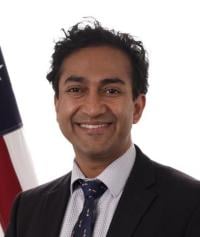Vinay Prasad, M.D., has left the FDA less than three months into the role as director of the Center for Biologics Evaluation and Research (CBER), overseeing vaccines and cell and gene therapies.
“Dr. Prasad did not want to be a distraction to the great work of the FDA in the Trump administration and has decided to return to California and spend more time with his family,” the U.S. Department of Health and Human Services said in a statement. “We thank him for his service and the many important reforms he was able to achieve in his time at FDA.”
Prasad was considered a rising star at the FDA, having just taken on the additional title of chief medical and science officer last month. But his short tenure was marked by controversies, including criticism from conservatives.
Prasad’s sudden departure comes amid a messy regulatory tug-of-war with Sarepta Therapeutics around the company’s controversial Duchenne muscular dystrophy (DMD) gene therapy Elevidys.
Following several patient deaths, the FDA demanded that Sarepta halt all shipments of Elevidys. Sarepta initially resisted but quickly fell in line, citing the importance of a good working relationship with the FDA.
Just as the FDA appeared to have gained an upper hand in what could have escalated into an intense regulatory showdown, the agency suddenly backed down. Monday, the FDA said Sarepta may resume giving Elevidys to DMD patients who can walk, even though no conclusions were offered about the three deaths that the agency had cited in its original request for a pause. The three death cases, including two Elevidys patients and another for an investigational Sarepta gene therapy, were all caused by acute liver failure in non-ambulatory patients.
“The patient community is an important voice, and the FDA will continue to listen to and respond to thoughts from the community impacted by DMD,” the FDA said in its July 28 release.
Prasad’s exit also followed criticism from Laura Loomer, a right-wing activist reportedly with access to President Donald Trump. Aiming at Prasad’s previous statements that didn’t seem to align with Trump’s policies, Loomer had called Prasad a “leftist saboteur” who was “undermining President Trump’s FDA.”
A Wall Street Journal opinion piece by Allysia Finley, a member of the publication's editorial board, labeled Prasad “a Bernie Sanders acolyte in MAHA drag” and someone “who doesn’t think patients can be trusted to make their own healthcare decisions.” The article also lambasted his past support for “a strong regulatory state” and condemned his role in forcing the market suspension of Elevidys.
Given the background leading up to Prasad’s departure, Leerink Partners analysts in a Wednesday note suggested that the development “could signal a shift towards the more permissive, patient advocacy centered ‘right to try’ wing of the MAHA movement vis-à-vis rare disease indications.”

When Prasad was tapped to lead the CBER in May, biopharma industry watchers, especially those in the cell and gene therapy space, were concerned over his more stringent regulatory mindset—including his past criticism of Elevidys—versus a more flexible approach adopted by the previous leadership.
Now, the Leerink team sees potential for a return to regulatory flexibility for rare disease with a CBER leader who’s more open to the “right-to-try” idea. That would be a net positive for genetic medicines for severe inherited illnesses, the analysts said.
Similarly, William Blair analysts in a separate Wednesday note argued that Prasad’s departure “may alleviate some of the overhang on the cell and gene therapy spaces” because Prasad has been critical of the accelerated approval pathway, which is critical to the field.
Prasad has also been critical of the FDA’s past regulation in the vaccines space, a position that the Leerink team predicted will probably remain—if not amplified—under a successor more aligned with the MAHA agenda.
During Prasad’s time, the FDA has tightened its regulation of COVID-19 vaccines. Because FDA Commissioner Marty Makary, M.D., has also expressed similar policies around vaccines in general, William Blair analysts argued that the departure of Prasad may not mean a change for the positive is coming for vaccines.